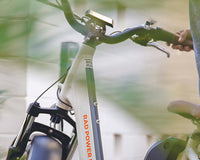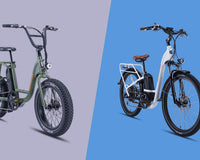Later this month, activist Marley Blonsky will use a RadCity commuter bike to traverse the streets of Washington, D.C.
She’ll be in the nation’s capital to deliver an important message to cycling advocates from across the country: Diversity matters in the bicycle industry, especially when it comes to welcoming people of all shapes and sizes.
Blonsky’s journey from rider to activist began after a visit to a Seattle-area bike shop left her frustrated.
She was in the market for an aggressive model, one that would be ideal for a daily commute that included steep hills. But the staff kept directing her towards cruiser-style bicycles.
She left the store empty-handed, with the sinking feeling that instead of seeing her as a capable cyclist, the staff was only focused on one thing: her weight. Thankfully, a supportive cycling friend helped her find the right bike, and Blonsky became a daily bike commuter and, more recently, a body-positive bike advocate receiving nationwide attention.
Blonsky’s experience highlights that for those of us who don’t “look like cyclists,” walking into a bike shop can be a daunting, and not always uplifting, experience. “There can be an assumption that you’re not capable, or unathletic,” she notes.
As a self-described “fat activist,” her mission is to widen the perspective on who belongs on a bicycle by using herself and her own powerful body as an example.
“If people don't see themselves represented, they may not see biking as a possibility,” Blonsky explained. “When that happens, they revert back to their cars.”
A recent article in The Washington Post features Blonsky and her friend Kailey Kornhauser as they prepare for their upcoming presentation at the 2020 National Bike Summit in Washington D.C. this month.
The theme of this year's Bike Summit? “Safe Streets for Everyone."
To that end, we've loaned Blonsky and Kornhauser a couple of our finest ebikes for a series of policy-minded group rides.
The first time Blonsky rode an electric bike, she was impressed.
“I remember zipping up a hill, and was like, ‘Whoa, my God, this is amazing!’” After that, she started evangelizing to friends and family, telling them they had to try it.
Marley doesn’t own an ebike yet, but she’s excited about their effect on the bicycle industry.
“Electric bicycles level the playing field,” she explains. “Riding a traditional bike doesn't work for everybody. A person might have movement challenges, or asthma, or kids in tow. Five years ago, ebikes were only an option if you're rich. And now that’s changing.”

Blonsky’s also optimistic about ebikes as a “last mile solution,” for people who may not have access to public transit options.
“In some areas, the bus only comes every 30 minutes,” she points out. “An ebike can open up getting to a job, or getting to school, or getting to wherever so much faster. I could list a million reasons why an electric bike is a great idea. And one reason is just that it's fun.”
That’s right: fun is a primary motivator for Blonksy. She’ll be the first to tell you that she’s not riding a bike to lose weight, or to change her body. She’s riding a bike to connect with nature, with her community, and to experience joy.
“Most of my favorite memories have been on a bicycle,” she said. “Biking can be revolutionary for people, to benefit their mental health and their social systems, and to engage with the world.”
Marley Blonsky wants more people on bicycles, and so do we. There’s plenty of ground to cover, to make the bicycle industry a more welcoming place to people of all genders, shapes, and backgrounds. What better way to find our footing than by ebike?






